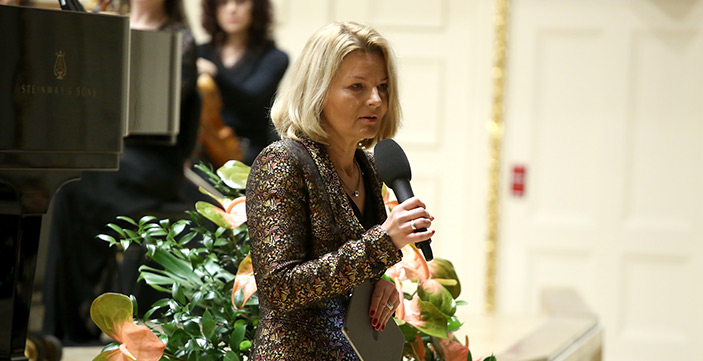news
The concert of Poznan Philharmonic Orchestra with the participation of Rafał Blechacz, held on the 14th of February in the Berlin Konzerthaus, finished with a standing ovation. The repertoire included Wedding Dances from the ballet The Song of the Earth by Roman Palester, Symphonie Concertante No. 3 for Violin, Viola, Cello, Piano and Orchestra by Aleksander Tansman and Piano Concerto in E minor Op. 11 by Frédéric Chopin.
Those who couldn’t attend this artistic event (or would like to listen to it once more) will have that opportunity on the 28th of February. That day at 8:03 pm the Berlin concert entitled “Composers Living Out of a Suitcase” will be aired on the national German radio Deutschlandfunk Kultur (online: www.deutschlandfunkkultur.de).
On World Radio Day, the 13th of February, Polish Radio awarded its most important prizes – Golden Microphones. This year editor Róża Światczyńska from Polish Radio Program II, well-known to music lovers from Poznan, found herself among the seven laureates. We can listen to her vivid stories about music during some of the Poznan Philharmonic Orchestra’s concerts.
Golden Microphone is a prize of Polish Radio awarded to Maestros by Maestros for their commitment and outstanding artistic achievements. The candidates are chosen from different areas of the radio, including theatre, music, literature, reportage, journalism and sound production. The prize has been established and granted for the first time in 1969. Members of the Golden Microphone Chapter are appointed by the Polish Radio Board from the laureates of the previous editions of the contest.
This year’s award ceremony was held on the 13th of February in the Witold Lutosławski Concert Studio of Polish Radio in Warsaw.


Phonographic Academy has just announced the nominations for Fryderyki Music Awards 2020 presented to the leading publications of classical music released in 2019.
Poznan Philharmonic Orchestra is among the leaders of the nominated symphonic orchestras.
In the Best Choral and Oratorias Music Album category there are two albums recorded by Poznan Philharmonic Orchestra led by Łukasz Borowicz: one with mythological cantatas “Milda” and “Nijoła” by Stanisław Moniuszko, as well as the composer’s “Paria”. Both of them are world phonographic premieres published by DUX in the Year of Stanisław Moniuszko.
Nominations in the Most Outstanding Polish Music Recording and the Best Symphonic and Concerto Music Album categories were also given to “100 for 100. Musical Decades of Freedom” album. It was released in cooperation with Poznan Philharmonic Orchestra conducted by Łukasz Borowicz which performed “Kaziuki” by Tadeusz Szeligowski. The album with “Milda” and “Nijoła” cantatas was recorded by Poznan Philharmonic Orchestra along with the soloists: Wioletta Chodowicz (soprano), Maria Jaskulska-Chrenowicz (soprano), Ewa Wolak (alto), Sylwester Smulczyński (tenor), Robert Gierlach (baritone), Szymon Kobyliński (basso), as well as the Podlasie Opera and Philharmonic Choir prepared by Violetta Bielecka.
Whereas the album featuring the concert version of “Paria” opera was recorded by the Poznan Philharmonics with the cooperation with such soloists as Katarzyna Hołysz (soprano), Robert Jezierski (basso), Yuri Gorodetski (tenor), Szymon Komasa (baritone), Tomasz Warmijak (tenor) and National Philharmonic Choir prepared by Bartosz Michałowski.
We are happy to add that yet another album under the leadership of the Chief Guest Conductor of Poznan Philharmonic Orchestra, Łukasz Borowicz, was nominated to Fryderyki Awards. This time he conducted the Polish National Radio Symphonic Orchestra in Katowice and Karol Szymanowski Philharmonic Choir in Cracow. They recorded, along with the soloists Claudia Barainsky, the album with Krzysztof Meyer’s Symphony No. 8 (DUX), which was nominated in the Best Contemporary Music Album category.
To find out who receives the Fryderyki statues we have to wait till the 8th of March, when the award ceremony for the best publishing of classical music of 2019 is held. It is organized in the headquarters of the Polish National Radio Symphonic Orchestra in Katowice.
We recommend you to read the review of the concert entitled “Halka on Stage and on Screen” by Piotr Nędzyński which appeared on the Maestro website.
We would like to inform you that the box office will be closed on the 24 th of December. We encourage you to purchase tickets online.
… VALUABLE AWARDS. Four recently announced nominations to International Classical Music Awards for Polish artists should not pass unnoticed. One of the most valued is for Łukasz Borowicz and Poznań Philharmonic Orchestra for the recording of two Feliks Nowowiejski’s symphonies, as he is another composer of the last century, whose music is worth remembering…
The excerpt derives from an article by Jacek Marczyński, the reviewer of Rzeczpospolita newspaper, in which he pays tribute to the album recorded by Poznań Philharmonic Orchestra conducted by Łukasz Borowicz and released by DUX label. The album is the world phonographic premiere of both of Feliks Nowowiejski’s works.
For the whole article – see here:
Rzeczpospolita, 19.12.2018, Jacek Marczyński – Scores Recovered or Rewritten
The unusual idea of presenting the priceless relic of Polish cinematography with music by Stanisław Moniuszko performed live falls within the Poznan Philharmonic tradition of merging film and music. This time during the concert entitled “Halka on Stage and on Screen” (held on Friday, 20th December at 7 pm in AMU Concert Hall) the pre-war silent film Halka directed by Konstantyn Meglicki will be accompanied by live music performed by Poznan Philharmonic Orchestra led by Adam Banaszak. The concert takes place within the “Polish Music is the Most Beautiful” cycle, the patron of which is Polish Bank PKO BP.
This event completes the celebrations of Stanisław Moniuszko bicentenary in Poznan Philharmonic. An extra feature closing the Moniuszko Year will be the sale of „The Pariah” albums released by DUX label. The concert version of the opera by Stanisław Moniuszko was recorded during the 23rd Ludwig van Beethoven Easter Festival, when performed by soloists, National Philharmonic Choir and Poznan Philharmonic Orchestra conducted by Łukasz Borowicz.
Another excellent review of the album recorded by Poznan Philharmonic Orchestra One of the latest CD albums of Poznan Philharmonic Orchestra – the world phonographic premiere of „Milda” and „Nijoła” cantatas by Stanisław Moniuszko – is gaining popularity among music lovers and receiving critical acclaim. We encourage you to read another review which appeared in the prestigious Pizzicato website dedicated to classical music.
13/12/2019, Opernhafte Kantaten von Stanislaw Moniuszko
We kindly inform that on Thursday the 12th of December the box office of Poznan Philharmonic is closed at 4:45 pm.
“100 for 100. Musical Decades of Freedom” – this is the name of the project realised by PWM (Polish Music Publishing House) to celebrate the 100th anniversary of regaining independence by Poland. One of its elements was to present 100 masterpieces written by Polish composers between 1918 and 2018.
As part of the project PWM, in collaboration with prominent artists and the best Polish orchestras, choirs and ensembles, performed 60 new recordings of the works from the “100 for 100” list. The remaining, carefully selected recordings come from, among others, the archives of Polish Radio and Polish Recordings.
“100 for 100. Musical Decades of Freedom” has recently appeared in music stores and bookshops. The publication comprises 36 albums with the recordings of all 100 works from the list. Among them you can find “Kaziuki” by Tadeusz Szeligowski, the first director of Poznan Philharmonic, presented by the Poznan Philharmonic Orchestra led by Łukasz Borowicz specifically for that occasion.

